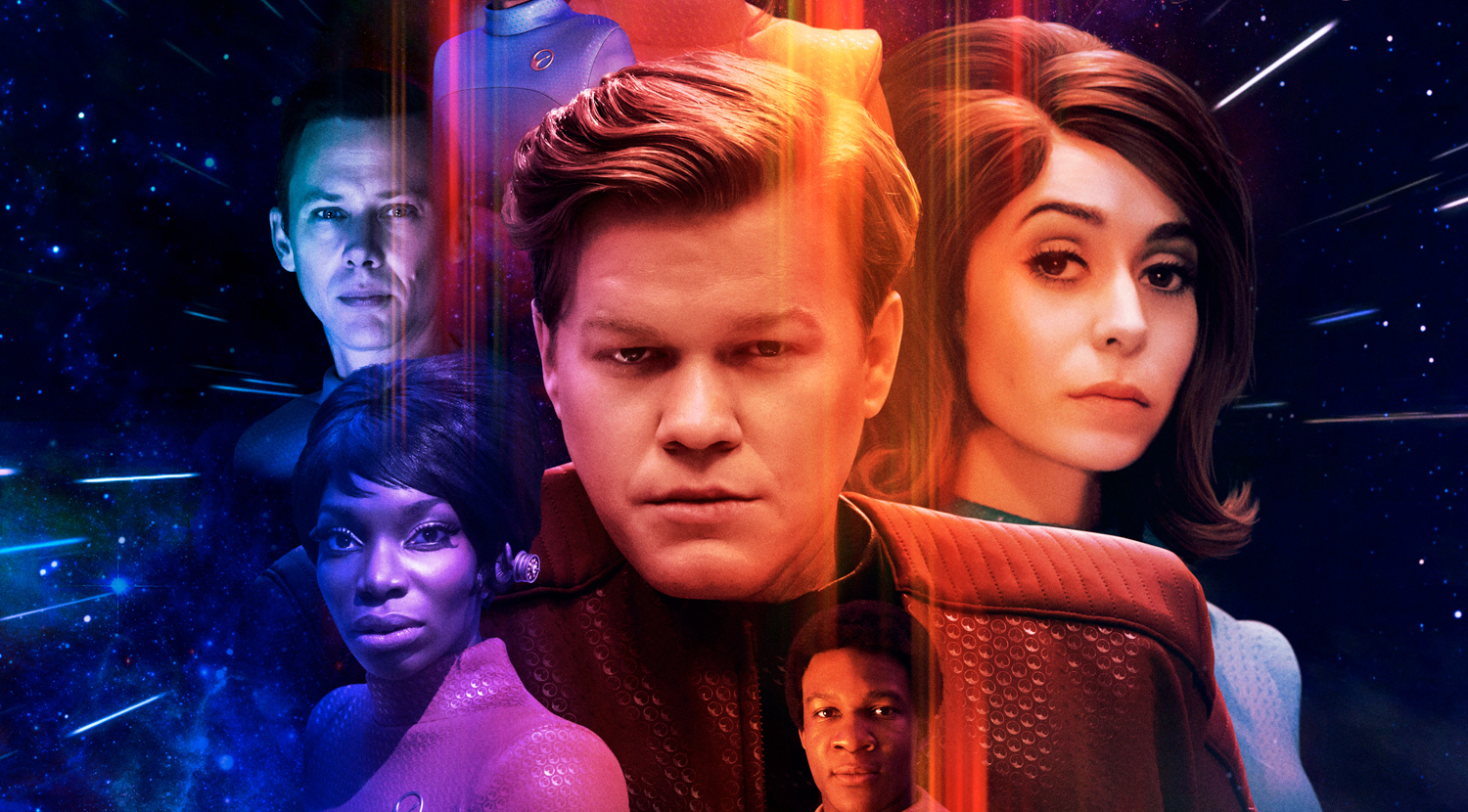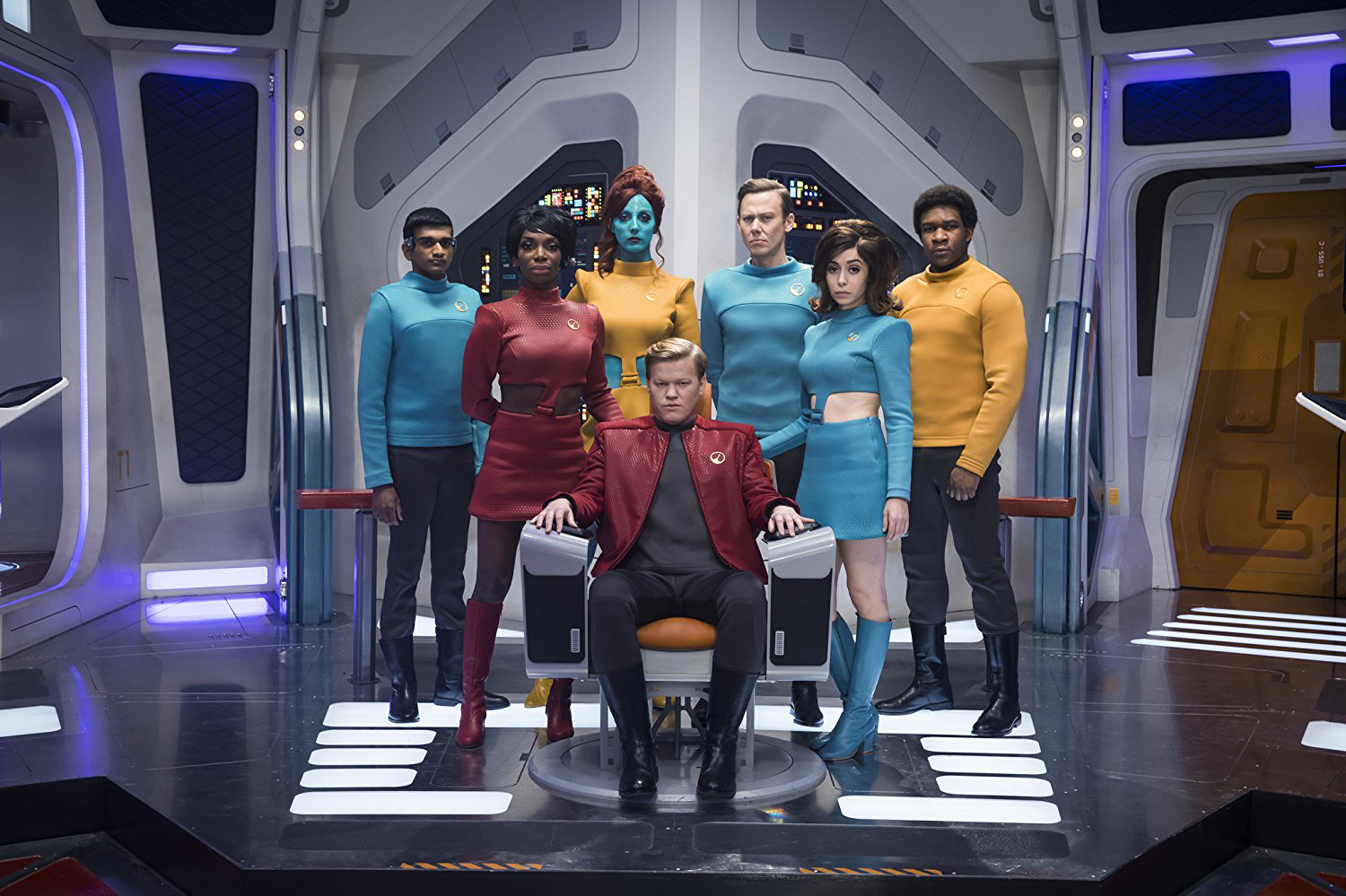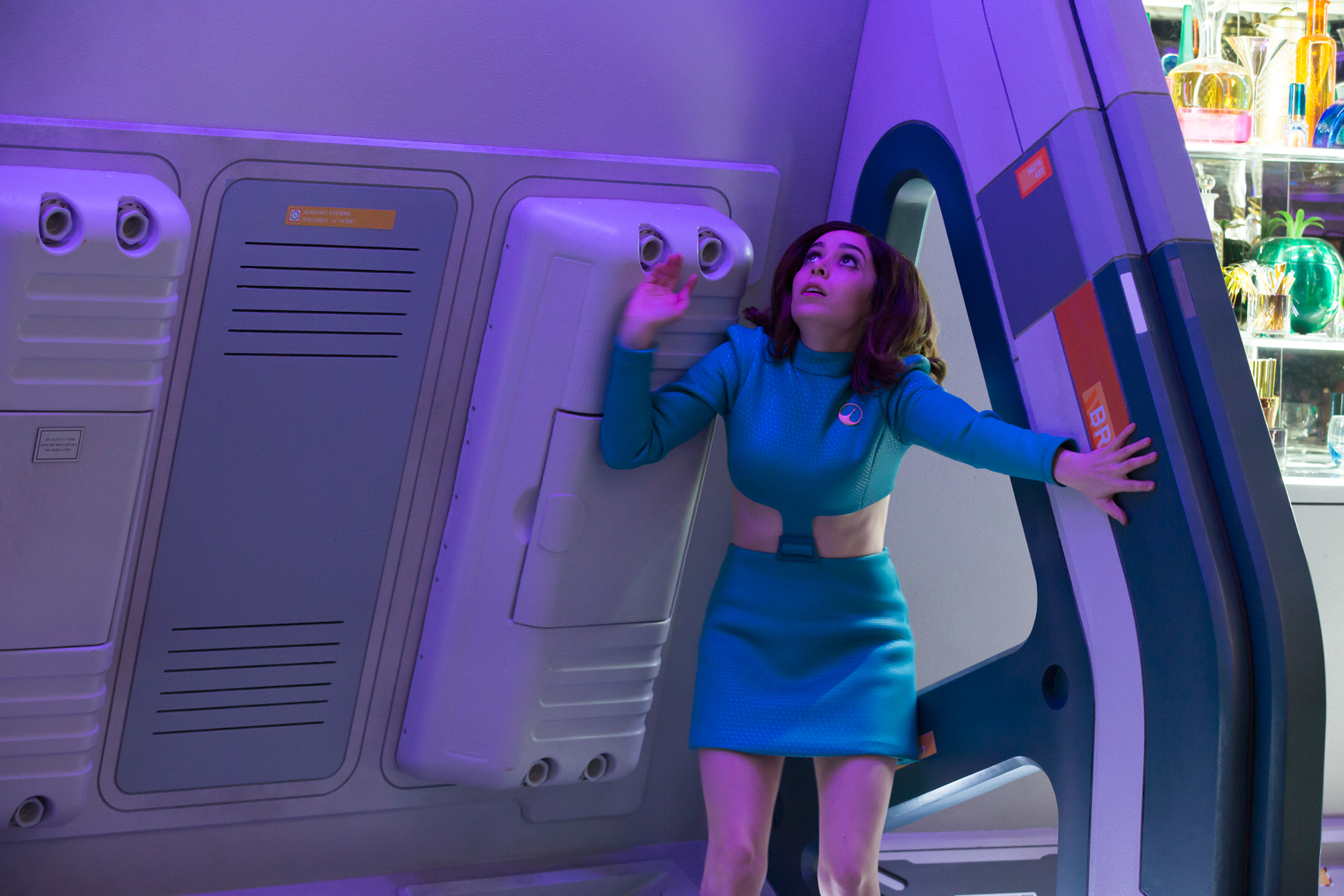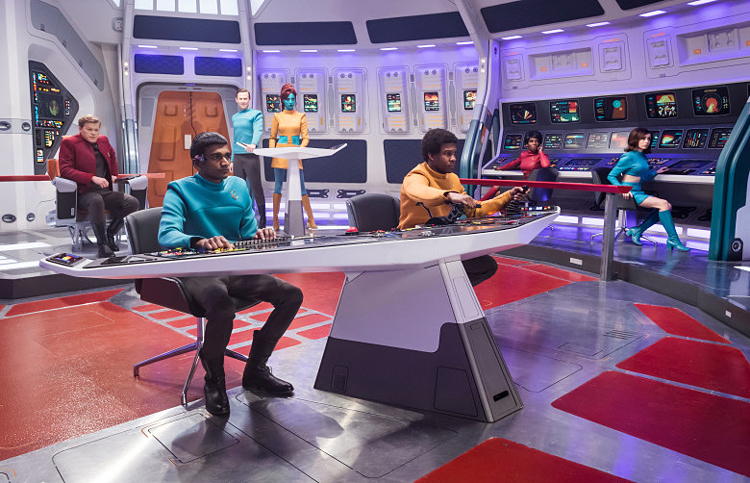Black Mirror Season 4, Episode 1 Review: ‘USS Callister’

There has long been a kind of prescience amongst the congregated masses of television. In the relative past, concepts and plot-points in Star Trek and The Simpsons have preceded eerily similar real-life developments – chief amongst these in the popular eye, the latter’s idea of a certain ‘President Trump’. More recently, British TV has been at the top of this game, sadly one for which no award yet exists. The first episode of Twenty Twelve, the London Olympics mockumentary, showed the organizers struggling with their 1000-day countdown clock; the day after this episode was broadcast, the real countdown clock in Trafalgar Square broke. And part of the brilliance of The Thick of It was always how close to reality it apparently got, judging by both typical moments of life imitating art, and by the general reactions of politicians as relayed by cast members.
Black Mirror itself has had moments of foresight – most obviously, the plot of the first ever episode, ‘The National Anthem’, showing Rory Kinnear’s Prime Minister being blackmailed into having sex with a pig live on television, followed four years later by the ‘Piggate’ allegations over David Cameron’s sexual proclivities during his initiation to the Piers Gaveston Society at Oxford.
But generally, Black Mirror has been at its best when arriving not ahead of time, but exactly at the right time, taking current event and putting them through the blender that is Charlie Brooker’s psyche. The first story of the fourth series – the latter six episodes of the twelve originally ordered when Netflix purchased the show from Channel 4, meaning decisions over renewal will presumably be dependent on how this series is received – opens the new batch with a perfect example of the capabilities the show has. ‘USS Callister’ is, visually, conceptually, a Star Trek spoof, in a similar but not identical vein to the 1999 classic Galaxy Quest, with the eponymous ship being that used in the cult sci-fi show ‘Space Fleet’ within the episode, rather than the episode’s ‘ultimate’ reality.
Where Galaxy Quest was content to just play off the comedic potential of washed-up actors meeting aliens who believed their cult sci-fi show to be a documentary, ‘USS Callister’ aims further, and succeeds. There is overt comedy in the episode – Brooker called it the most mainstream Black Mirror episode yet, and he’s not wrong – but, amongst a maelstrom of thematic and narrative concepts, the central thrust is typically Black Mirror, exploring the overlap of fanboyism, rape culture and misogyny with the pernicious enabling capacity of tech.
The central character, at least at first, is the socially awkward Robert Daly (Jesse Plemons), the designer of a revolutionary shared reality game, Infinity – think of a less all-encompassing version of Ready Player One’s ‘Oasis’ – and now the CTO of Callister, the company running the game, so named after Space Fleet’s ship. While Daly might have been allowed to choose the name to reflect his sci-fi fandom, there’s not much else going for him. His business partner, James Walton (Jimmi Simpson), is the CEO, face of the company, and darling of the office. Daly might officially be the ‘second boss’ alongside Walton, but it’s clear who is in charge. It also becomes clear that Daly is not the sympathetic, underappreciated protagonist he’s initially set up to be. Even after 6 years and more than a dozen episodes of Black Mirror, the inevitable volte-face still comes as a kind of shock when it does arrive, and in ‘USS Callister’, it arrives far quicker than in last year’s superb ‘Shut Up and Dance’, also co-written by William Bridges alongside Brooker. Where that episode withheld the context of the pornographic images Kenny was filmed masturbating to until the closing scenes, ‘USS Callister’ confirms Daly’s antagonism around the 20-minute mark. The opening scene, where the staff of Callister act out a fantasy of the USS Callister, with Daly as captain, goes from just being a fantasy, to something entirely more sinister. Cristin Milioti’s new employee Nanette warmly introduces herself to Daly, whose coding work is the main reason she joined Callister.
It also becomes clear that Daly is not the sympathetic, underappreciated protagonist he’s initially set up to be. Even after 6 years and more than a dozen episodes of Black Mirror, the inevitable volte-face still comes as a kind of shock when it does arrive, and in ‘USS Callister’, it arrives far quicker than in last year’s superb ‘Shut Up and Dance’, also co-written by William Bridges alongside Brooker. Where that episode withheld the context of the pornographic images Kenny was filmed masturbating to until the closing scenes, ‘USS Callister’ confirms Daly’s antagonism around the 20-minute mark. The opening scene, where the staff of Callister act out a fantasy of the USS Callister, with Daly as captain, goes from just being a fantasy, to something entirely more sinister. Cristin Milioti’s new employee Nanette warmly introduces herself to Daly, whose coding work is the main reason she joined Callister.
Then, Shania (Michaela Coel, in her second Black Mirror appearance after ‘Nosedive’) warns Nanette away from Daly, he overhears this conversation, lifts her DNA from a leftover coffee cup, uploads it to his offline build of Infinity, and suddenly, a digital copy of Nanette is waking up in an inescapable simulation of Space Fleet, playing the role of a new recruit to the USS Callister, alongside her similarly trapped colleagues. In this reality, Daly is in total control, and has free rein to act out all his internalized anger against Walton and the outside world.
Much like the concept of the ‘cookies’ of ‘White Christmas’, ‘USS Callister’ excels at unpicking the morality attached to theoretically ‘harmless’ environments. From a particularly desensitized perspective – indeed, from Daly’s perspective – Infinity is still ‘just’ a game, those inside it, ‘just’ characters, and any narrative that they are made to act out is no more than hyperreal fanfiction. These aren’t the ‘real’ Nanette, Walton, Shania et al., just as in ‘White Christmas’ it wasn’t the ‘real’ Greta who was made to run her physical self’s smart home, or the ‘real’ Joe who – due to the police leaving the cookie on overnight at a speed of 1000 cookie years per 1 real minute – would spend almost a million years listening to ‘I Wish It Could Be Christmas Everyday’ before finally being switched off.
Yet it’s not accurate to say that Daly is purely indifferent to the welfare of those he’s trapped inside ‘his’ Infinity. By definition, he can’t be indifferent, because their entire placement in the simulation is done as a form of punishment against their ‘real’ selves – just as ‘cookie Joe’ was punished as pre-legal retribution for the actions of ‘real Joe’. But even looking past that distinction, it’s also clear that his satisfaction runs almost directly inverse to their wellbeing; he gains pleasure and enjoyment from exploiting his power over them in a way he’s incapable of in the real world. Further, it’s a kind of power that doesn’t exist in the real world, one that’s unbound by consequence or chronology. He can throw Walton’s son out an airlock and make Walton watch… and then bring the kid back as a threat to do it again, and again.
He can sexually assault his female colleagues – having them line up to provide him with a celebratory kiss upon completion of their Space Fleet ‘missions’ – with guaranteed impunity, because it’s an entirely one-sided sexual fantasy in which the colleagues themselves don’t even know it’s happening – though as Shania alludes to, they do notice something off about him – and in which the male and female copies are lacking genitalia, reduced to Ken and Barbie like physiology, and stripped of any chance of mutual sexual experiences between themselves. And he can subvert his own storylines on the spot, so that instead of finally killing his archenemy Valdack – and in so doing, allow the colleague portraying Valdack the mercy of release from the simulation – he simply has him locked away, so the trauma of the simulation persists. The manner in which the ‘real’ Daly releases his internalized behaviour – his misogyny and discontent at his social, professional and physical circumstances – is obviously tied to the technological potential open to him as a Black Mirror character, and more specifically as a Black Mirror character whose creation of this technology allows him his own private playground, walled off from the online space, one in which Walton is his footrest, and where his hairline is still intact. But as with most of Black Mirror, the behaviour is only enabled, rather than created, by the technology. That, primarily, is where the significance of the timing of the episode arises. Brooker and Bridges wrote ‘USS Callister’ in November 2016, yet the release in December 2017 comes during a period where the institutionalization of patriarchal power structures, misogyny, sexism, and a whole gamut of connected issues within Hollywood, and the entertainment industry at-large, have been laid bare. Daly, in ‘his’ world, exploits the capabilities of Infinity, but it is behaviour that can be transferred and applied to various real life situations.
The manner in which the ‘real’ Daly releases his internalized behaviour – his misogyny and discontent at his social, professional and physical circumstances – is obviously tied to the technological potential open to him as a Black Mirror character, and more specifically as a Black Mirror character whose creation of this technology allows him his own private playground, walled off from the online space, one in which Walton is his footrest, and where his hairline is still intact. But as with most of Black Mirror, the behaviour is only enabled, rather than created, by the technology. That, primarily, is where the significance of the timing of the episode arises. Brooker and Bridges wrote ‘USS Callister’ in November 2016, yet the release in December 2017 comes during a period where the institutionalization of patriarchal power structures, misogyny, sexism, and a whole gamut of connected issues within Hollywood, and the entertainment industry at-large, have been laid bare. Daly, in ‘his’ world, exploits the capabilities of Infinity, but it is behaviour that can be transferred and applied to various real life situations.
The revelations concerning Harvey Weinstein and others such as Kevin Spacey are prominent examples of how similar complexes and behaviour traits are combined with similarly unassailable positions of power without any technological context, while the application of technology brings forth the relevance of anonymized internet communication, doxing, abuse in gaming and revenge porn. Many such issues are not universally applicable, but the principle behind them, and ‘USS Callister’, is: the way in which we conceive the distinction between ‘real’, ‘virtual’ and ‘non-real’ interactions.
Like any form of abuse or exploitation, it’s a spectrum. Walton is a victim of Daly within Infinity, but the real Walton seems to exploit his position; Shania describes him simultaneously as “basically an alright bloke” and “a really good guy”, but also says that “he’s a bit of a player” and that, “chuck a ham sandwich across the room and he’ll fuck it before it hits the ground”. There’s a certain level of humour in the delivery of that information. Part of that is Michaela Coel’s magnificent ability to ground and normalize pretty much any dialogue – case in point, the ‘Hello penis’ scene from episode 4 of Chewing Gum – but part of it is entirely the point of the scene. We don’t know how much hyperbole Shania is applying, but we do know that what we see chimes with what she says; Walton sitting on Nanette’s desk, complimenting and brushing her sweater on her first day, without any concept of boundaries.
Yet the particularly interesting moment within the context of interactions occurs later in the episode. To ensure the real her sticks to the plan that’ll help them escape Daly’s Infinity, digital Nanette gives the rest of the crew the one thing she knows will convince her: the password to her PhotoCloud account, and thus, total access to her private, explicit photos. The ethics of blackmailing oneself – even if, as above with Daly’s consequential impunity, it is not simply oneself – is an intriguing thing to consider in its own right, but what’s key here isn’t the choice, but the lack of deliberation or consideration Nanette gives to the ethical issue. It’s the logical option, so she takes it. It doesn’t diminish the situation she’s in, nor cancel out Daly’s villainy in any meaningful way, but it does provide a microcosm of the principle in question, of the red lines crossed so easily and without thought through the medium of technology. As far as Black Mirror goes, ‘USS Callister’ has a relatively happy ending, and also one that is thematically fitting. The crew’s escape via the Infinity update-wormhole isn’t death or deletion as they anticipated; instead, they’re connected to Infinity-proper, free to roam the infinite expanse of the game-world with agency, and to encounter none other than Aaron Paul, in amusing form as the voice-only ‘Gamer691’. Daly, meanwhile, is forced to confront the existence of consequences suddenly converging on him, his mind trapped inside his offline Infinity, the lights slowly going off forever, his physical body irrevocably en route to starvation and death. So, the good guys escape, and the bad guy is doomed to a slow, tortuous death. But I do wonder if the idea of this as a happy ending isn’t a matter of perspective. By that, I don’t mean that there’s any perspective in which Daly is somehow the victim here, rather than someone who entirely got what was coming to them, and equally, this is only at the end because of the chronology of the episode, rather than because it’s the most important bit of it (it’s not).
As far as Black Mirror goes, ‘USS Callister’ has a relatively happy ending, and also one that is thematically fitting. The crew’s escape via the Infinity update-wormhole isn’t death or deletion as they anticipated; instead, they’re connected to Infinity-proper, free to roam the infinite expanse of the game-world with agency, and to encounter none other than Aaron Paul, in amusing form as the voice-only ‘Gamer691’. Daly, meanwhile, is forced to confront the existence of consequences suddenly converging on him, his mind trapped inside his offline Infinity, the lights slowly going off forever, his physical body irrevocably en route to starvation and death. So, the good guys escape, and the bad guy is doomed to a slow, tortuous death. But I do wonder if the idea of this as a happy ending isn’t a matter of perspective. By that, I don’t mean that there’s any perspective in which Daly is somehow the victim here, rather than someone who entirely got what was coming to them, and equally, this is only at the end because of the chronology of the episode, rather than because it’s the most important bit of it (it’s not).
But it’s the tone that separates the episode from most others of Black Mirror, rather than the narrative. Tonally, it’s not quite ‘San Junipero’ – indeed, it can’t be, really, due to the comparative number of characters to resolve – but it’s close. Yet there’s always the question in the background of Black Mirror as to the idea of proportional justice; if it can ever exist, whether an eye for an eye is a remotely valid moral stance, and who exactly is the beneficiary of such justice. Does Victoria deserve the daily remembrance she is forced to undertake in ‘White Bear’? Does ‘cookie Joe’ deserve to spend a million years trapped in that cabin? Does Daly deserve to spend his dying days – or weeks, months, years; how quickly does time pass ‘by default’ in Infinity? – trapped inside literal nothingness, with only the sensation of sitting inside the shuttle to remind him of his existence?
Saying that yes, they do seem the obvious pick – certainly, it’s the option that the worryingly large part of the British public in favour of a return of the death penalty would choose. But that kind of certainty and binarism tends to be what Black Mirror warns against; it’s not that simple, nor can it be the case that a ‘bad’ character thus deserves nightmarish punishment. What is clear, is that such an episode demands such interrogation, because even if there isn’t an answer out there, it’s a testament to the quality that the question can be raised, while being a secondary – or even tertiary, if one separates misogyny and rape culture from the connected ethics of virtual exploitation – issue for the episode. Black Mirror, unsurprisingly, continues to excel.
★★★★★
SaveSave
SaveSave


